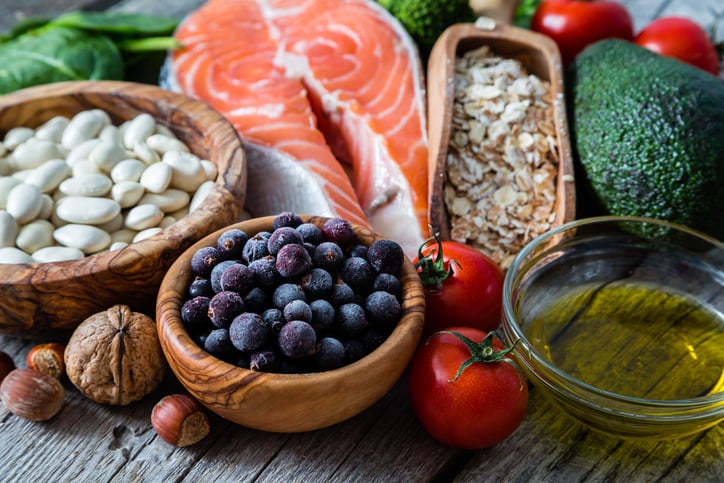What is the DASH Diet? A Beginner’s Guide

No diet is perfect for everyone. We all have unique considerations—from metabolism to age to goals to food preferences to activity level to food sensitivities to budget to family—and as a result, the “best” diet for your friend or favorite celebrity may not be the “best” diet for you.
With that being said, while there are countless diets out there, some have a bit more history and science behind them. One such diet is known as the DASH diet, which ironically has been ranked the “Best Overall Diet” for seven years running by US News & World Report.
The word DASH stands for “Dietary Approaches to Stop Hypertension,” so it’s pretty obvious this diet was designed to help reduce blood pressure and promote heart health. This is important for a lot of folks. In fact, according to the Centers for Disease Control and Prevention (CDC), about 32% of Americans adults (75 million) have high blood pressure (which is called “hypertension”), and another 1 in 3 adult Americans is on the verge of high blood pressure with higher than normal blood pressure (which is called “prehypertension”). In other words, 2 out of 3 adults should be concerned about their blood pressure.
Anyone—even you, your children, and perhaps grandchildren—may unknowingly have high blood pressure. Even more alarming, the American Heart Association refers to high blood pressure as the “silent killer” because there are often no obvious signs or symptoms indicating that something’s wrong. This is concerning because high blood pressure seriously increases the risk for heart disease and stroke, which are the leading and third-leading causes of death, respectively, in the U.S.
Yikes! That explains why you get cuffed (blood-pressure cuffed, that is) nearly every time you walk into a doctor’s office.
The DASH Diet: a Brief History
The DASH diet is the product of one of the largest, most detailed research studies to date. The National Institutes of Health, which funded the DASH Diet trials, teamed up with five of the most well-respected medical research facilities for the multi-center study including: Johns Hopkins University, Duke University, Kaiser Permanente Center for Health Research, Brigham and Women’s Hospital, and Pennington Biomedical Research Center. The trials began in 1993, and the promising results were first published in The New England Journal of Medicine in 1997.
There have been hundreds more studies published since the original work, and together, they have shown that the DASH diet can “substantially” lower blood pressure. In fact, studies indicate that participants following the DASH Diet can drop systolic blood pressure (the “top,” or first, number in a blood pressure reading) by 8 to 14 points. Because it is so successful for reducing blood pressure (and “bad” cholesterol), the DASH diet has become the go-to recommendation for heart health by many health professionals, and it is promoted by numerous health organizations, such as the National Heart, Lung, and Blood Institute and the American Heart Association.
What about weight loss? After all, being overweight or obese significantly increases your risk of developing high blood pressure and heart disease. Studies show that the DASH diet is also very effective for weight loss. In fact, a recent critical review that analyzed the results of thirteen different diet trials showed that the DASH diet resulted in significantly greater weight loss and reductions in waist measurements than a standard reduced-calorie diet. The researchers concluded, “DASH diet is a good choice for weight management particularly for weight reduction in overweight and obese participants.” This is great news because even a modest 10-pound drop in weight can lower blood pressure.
Defining the DASH Diet
One of the most important criteria researchers were interested in when creating the DASH diet was that it be easy to follow with a focus on foods that are readily available and people are typically eating already. While calories are important, the DASH diet trials typically “cycle” calories from low to high every five days. More importantly, the DASH diet emphasizes choosing foods that are higher in potassium, magnesium, calcium, fiber, and protein, which have all been shown to be inversely related to blood pressure. In other words, eating more of these nutrients tends to result in lower blood pressure.
Along those lines, the DASH diet focuses on eating an abundance of fruits and veggies, as well as whole grains and low-fat dairy. The diet also allows for moderate intake of lean proteins (such as lean meat, poultry, and fish), nuts, seeds, and legumes. In other words, the DASH diet is a stark contrast from the typical American diet, which is loaded with refined grains, added sugar/sweets, sugar-sweetened beverages, added fat and oils, processed meat, and very little fruits, veggies, nuts, and legumes.
Finally, the DASH diet naturally promotes a healthy sodium intake by substantially reducing processed foods, the main source of dietary sodium. The DASH diet also emphasizes moderation when it comes to alcohol consumption.
Here’s a quick overview of what’s “allowed.”

Is the DASH Diet Right for You?
The DASH diet has its proponents and benefits. For example, it has been proclaimed the “Best Diet Overall” by U.S. News & World Report for the last seven years in a row. It’s fairly easy to follow and can help lower blood pressure when followed as part of a healthy lifestyle. There’s certainly no argument that the average American could stand to eat more fruits and vegetables—a lot more! Even more, the majority of folks would be far better off by slashing their intake of unhealthy processed foods, which the DASH diet reduces substantially.
Yet there are also drawbacks. For instance, the DASH diet is, for all intents and purposes, a low-fat approach. However, we have learned that fat is not evil. In fact, even saturated fats, like those found in coconut oil and full-fat dairy, can have noteworthy health benefits. Interestingly, some very recent research has shown that a higher-fat, lower-carbohydrate version of the DASH diet (with full-fat dairy and less fruit juice) is just as effective at lowering blood pressure—compared to the standard DASH diet—and perhaps even more effective at improving blood cholesterol and triglycerides.
The original DASH diet also permits artificial sweeteners, which, as we’ve discussed numerous times, have been shown to have significant unintended consequences and most should, quite frankly, be avoided. Thankfully, the latest revision to the DASH diet emphasizes that all foods are additive-free with no artificial sweeteners. Another potential downside, the DASH diet focuses on a high intake of whole grains, which can be difficult for some folks to digest, resulting in unwanted digestive discomfort and side effects.
Is the DASH diet right for you? If you’re currently eating a typical American diet, are looking to reduce blood pressure, want a diet that’s fairly easy to follow with common, easy-to-find foods, and are looking to lose a reasonable amount of weight in the process, it could be worth considering.
Again, there is no one-size-fits-all diet approach, and there are many options to consider, including the DASH diet, the Mediterranean diet, the Paleo diet, Intermittent Fasting, and the Ketogenic diet. It’s about finding what fits your lifestyle, your metabolism, your goals, and your preferences. Remember that even the best-laid plan is just a starting point, and you may need to modify or tweak it to best suit you and your needs. And we’re here to answer your questions as you learn to listen to your body and find the right nutrition plan for you and your short- and long-term goals.
Supercharge Your Diet Results with IC-5
IC-5, which is scientifically-designed to promote insulin sensitivity and improved carb tolerance, is one of our top diet-boosting supplement.
With IC-5, you know that you are supporting carbohydrate tolerance, keeping potentially harmful AGEs at bay, and amplifying the anti-aging effects of the ketogenic diet. It’s a triple threat for overall health and anti-aging!






